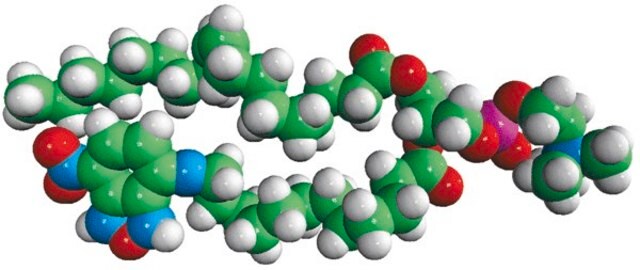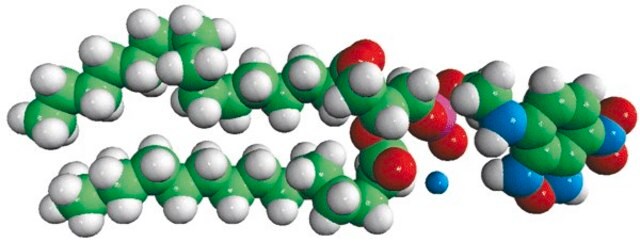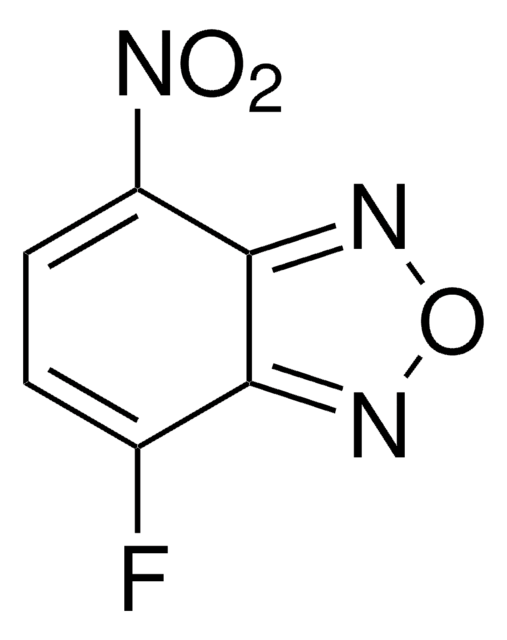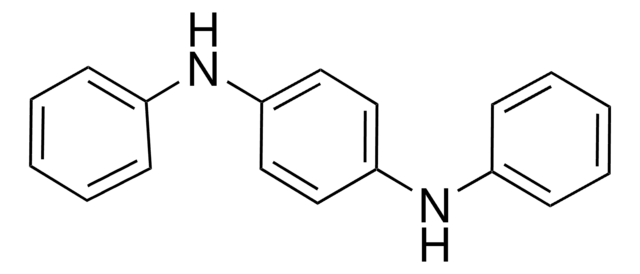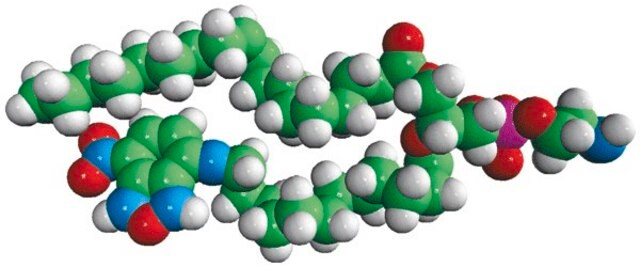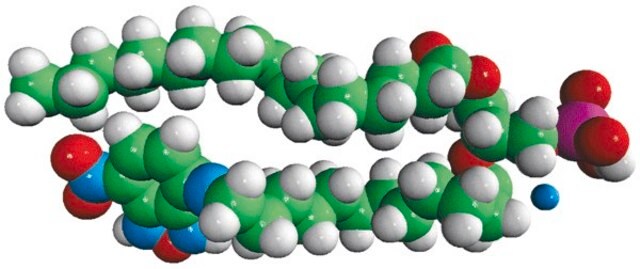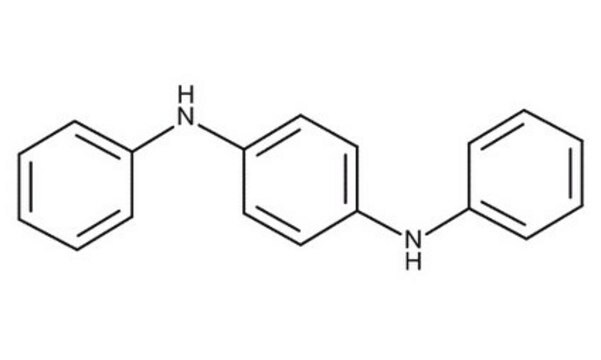おすすめの製品
アッセイ
>99% (TLC)
形状
powder
包装
pkg of 1 × 1 mg (810173P-1mg)
メーカー/製品名
Avanti Research™ - A Croda Brand 810173P
輸送温度
dry ice
保管温度
−20°C
関連するカテゴリー
詳細
Phosphatidic acid (PA) is a simple anionic membrane phospholipid. The phospholipid contains phosphomonoester polar head group and two long hydrophobic acyl chains. 7-nitrobenz-2-oxa-1,3-diazol-4-yl (NBD) PA is a fluorescent analog with 7-nitrobenz-2-oxa-1,3-diazol-4-yl (NBD) attached to the sn-2 fatty acid of PA.
アプリケーション
16:0-06:0 NBD PA 1-palmitoyl-2-{6-[(7-nitro-2-1,3-benzoxadiazol-4-yl)amino]hexanoyl}-sn-glycero-3-phosphate is suitable to measure the substrate transport by an increase in cellular fluorescence to determine type 4 P-type ATPases (P4-ATPase) discrimination and its glycerophospholipid (GPL) substrate selection through the directed evolution of a sphingomyelin (SM) flippase.
生物化学的/生理学的作用
Phosphatidic acid (PA) is crucial for intracellular signaling involved various cellular processes including membrane trafficking and sperm hyper-activation. It plays a vital role in lipid synthesis.
包装
5 mL Amber Glass Screw Cap Vial (810173P-1mg)
法的情報
Avanti Research is a trademark of Avanti Polar Lipids, LLC
保管分類コード
11 - Combustible Solids
適用法令
試験研究用途を考慮した関連法令を主に挙げております。化学物質以外については、一部の情報のみ提供しています。 製品を安全かつ合法的に使用することは、使用者の義務です。最新情報により修正される場合があります。WEBの反映には時間を要することがあるため、適宜SDSをご参照ください。
Jan Code
810173P-1MG:
810173P-BULK:
810173P-VAR:
試験成績書(COA)
製品のロット番号・バッチ番号を入力して、試験成績書(COA) を検索できます。ロット番号・バッチ番号は、製品ラベルに「Lot」または「Batch」に続いて記載されています。
Phosphatidic acid binding proteins display differential binding as a function of membrane curvature stress and chemical properties
Putta P, et al.
Biochimica et Biophysica Acta, 1858(11), 2709-2716 (2016)
Phosphatidic acid in membrane rearrangements
Zhukovsky MA, et al.
Febs Letters, 593(17), 2428-2451 (2019)
Mikhail A Zhukovsky et al.
FEBS letters, 593(17), 2428-2451 (2019-08-01)
Phosphatidic acid (PA) is the simplest cellular glycerophospholipid characterized by unique biophysical properties: a small headgroup; negative charge; and a phosphomonoester group. Upon interaction with lysine or arginine, PA charge increases from -1 to -2 and this change stabilizes protein-lipid
A Chauhan et al.
Neurochemical research, 25(3), 423-429 (2000-04-13)
Fibrillar amyloid beta-protein (Abeta) is the major protein of amyloid plaques in the brains of patients with Alzheimer's disease (AD). The mechanism by which normally produced soluble Abeta gets fibrillized in AD is not clear. We studied the effect of
Karen M Henkels et al.
Oncotarget, 7(30), 47002-47017 (2016-06-04)
The intracellular concentration of the mitogen phosphatidic acid (PA) must be maintained at low levels until the need arises for cell proliferation. How temporal and spatial trafficking of PA affects its target proteins in the different cellular compartments is not
ライフサイエンス、有機合成、材料科学、クロマトグラフィー、分析など、あらゆる分野の研究に経験のあるメンバーがおります。.
製品に関するお問い合わせはこちら(テクニカルサービス)